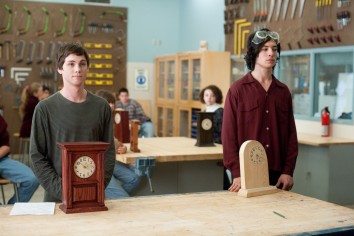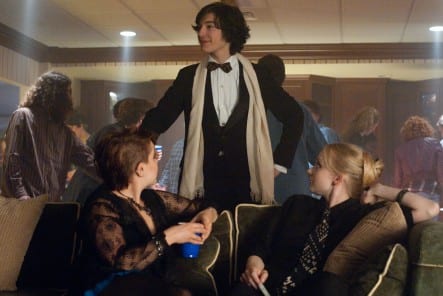 In the print edition this week, we have Larry Ferber’s interview with The Perks of Being a Wallflower writer-director Stephen Chbosky; here, our celebrity hunter Chris Azzopardi sat down with one of that film’s stars, Ezra Miller. Miller talks about the cathartic experience of being a confident teen, his happy upbringing and why he’s never met a straight man.
In the print edition this week, we have Larry Ferber’s interview with The Perks of Being a Wallflower writer-director Stephen Chbosky; here, our celebrity hunter Chris Azzopardi sat down with one of that film’s stars, Ezra Miller. Miller talks about the cathartic experience of being a confident teen, his happy upbringing and why he’s never met a straight man.
The perks of Being Ezra Miller
Twenty is a young age to have already played two unique characters — from the dark to the fearless. But Ezra Miller — who was Tilda Swinton’s evil son in We Need to Talk About Kevin and plays Patrick, the lovable outsider with swagger in the film adaptation of the coming-of-age novel The Perks of Being a Wallflower, opening Friday in Dallas — the boy every gay person wishes he could be. Even Miller.
The young actor talked about not being that kid in high school, breaking label barriers and coming from a “whole queer-ass family” — who dressed him in drag.
Dallas Voice: What was your high school experience? Were you out then? Ezra Miller: Yeah, definitely. But I wasn’t shouting it out. I was unabashedly me. I was always having to leave high school, though, because I started working, so that was pulling me out of school. When I’d come back, there was a certain resentment: “You are no longer one of us. You have betrayed our pack.” And I dropped out of high school when I was 16 years old because, first of all, the form and function of the schooling system never made any sense to me in the context of education, but also there was some ostracizing at play. At that point in my youth experience, I knew that feeling all too well. I immediately realized that I had just turned 16 and that it was best, and technically legal, for me to flee.
How was it playing a character that you wished you could’ve been in school? I came out of the movie feeling like I had a bunch to learn from the character I just played, and then I came to the unfortunate conclusion that he was a fictional character and he didn’t exist. I mean, to be able to hold your dignity and your pride, and to be able to empower yourself and love yourself in high school, is a feat.
That scene where you stand up for yourself in the lunchroom was probably something that hit close to home. Yeah. You picture that moment where you effectively fight back, but then of course Patrick does, in that situation, end up getting held and pummeled and sort of relentlessly beaten on — that’s a reality, too. You can cultivate all of the courage and pride and power to stand up for yourself and still get beat to a pulp. I had that experience a few times. That scene was so important to everyone — to [writer-director] Stephen [Chbosky] but really to [co-star] Johnny [Simmons] and myself. Having experienced things like that in our lives, we were really determined to get some bruises to make that fight brutal, the way that sort of peer-inflicted violence is — just horribly brutal.
 Bullying is brutal, and it’s obviously become an epidemic in the last few years. What do you think young people who are victims of bullying might find empowering about Patrick? I’m hoping that there could be a theoretical audience member who could watch Patrick in this fearless state of self-preservation and rebellion and come to the thought that anyone who dares to cultivate the courage to stand up for themselves has immediately already won the battle. The second you endow yourself to be your own best protector — your own best friend, your own best lover — you’ve already won. People can put you through a lot of horrific psychological, emotional and physical conditions, but if you have that for a support system for yourself, by yourself, there’s only so much anyone can ever do.
Bullying is brutal, and it’s obviously become an epidemic in the last few years. What do you think young people who are victims of bullying might find empowering about Patrick? I’m hoping that there could be a theoretical audience member who could watch Patrick in this fearless state of self-preservation and rebellion and come to the thought that anyone who dares to cultivate the courage to stand up for themselves has immediately already won the battle. The second you endow yourself to be your own best protector — your own best friend, your own best lover — you’ve already won. People can put you through a lot of horrific psychological, emotional and physical conditions, but if you have that for a support system for yourself, by yourself, there’s only so much anyone can ever do.
In the movie, Charlie is a troubled loner, but you open your world up to him and affect his life immensely. Who were your queer role models growing up? My sisters, who were really strong and really empowered and who just were constantly making sure that I felt the love and that I was thinking for myself, but at the same time had my back. They were, for me as a younger person, the only role models I ever needed. My flesh and blood consumed almost my whole frame of perception from when I was a younger child.
So your sisters are queer too? Yeah. It’s a whole queer-ass family! [Laughs] You know, it’s pretty much the most ridiculously happy and lucky situation a boy like me could ask for. I really thank all sorts of illusive deities for the family that I have every day.
After seeing you as Frank-N-Furter during The Rocky Horror Picture Show scene, something tells me this wasn’t your first time doing drag. You were that good. Thanks, darling! I’ve definitely dabbled from a young age. Those older sisters of mine actually started putting me through drag school when I was, like, 3. I remember running a lemonade stand and I was all made-up: My hair got did, I was in a dress and I remember getting it going so hard even then that people would come up to one of my sisters and say, “I saw you and your sister selling lemonade today.” [Laughs]
Yeah, I’ve definitely served some time in the mighty and honorable school of drag. When I was in middle school — it was combined with a high school, and the theater department was the same and it was the year that high schools were allowed to do Rent – I jumped on Angel really fast, so I even got to dance in drag and rock some pumps. So, I’ve definitely had some informative experiences.
You owe your sisters some gratitude for giving you drag training. Really, man! I was such a goofily happy kid when we were doing that. It was such, like, a ridiculous dream come true.
 You sound like the polar opposite of your character in We Need to Talk About Kevin. You were so not Kevin as a child. Yeah, that’s true. But it’s good to stretch in many different directions. I’m still convinced I can go much darker than anywhere I’ve gone so far, and I’m pretty sure there are greater possibilities. I really feel like I’ve only just scratched a really minute surface.
You sound like the polar opposite of your character in We Need to Talk About Kevin. You were so not Kevin as a child. Yeah, that’s true. But it’s good to stretch in many different directions. I’m still convinced I can go much darker than anywhere I’ve gone so far, and I’m pretty sure there are greater possibilities. I really feel like I’ve only just scratched a really minute surface.
You develop a small crush on Charlie in Wallflower. Have you ever fallen for a straight boy before? I mean, I just never believe anyone when they say they’re straight.
The media obviously isn’t sure how to interpret your “queer” identity; I’ve seen you called gay by many news outlets. Why do you prefer queer? And what do you think of just abandoning labels all together? I think queer is that doorway into the L, G, B and T. Queer is the doorway to where we should all be at. In a perfect Garden of Eden world, we are all pretty damn — I don’t know if you say genderless or omni-gendered — but we’re all omnisexual, we’re all balanced and none of us are participating in a binary. But until that day comes, these labels and these ways that we can identity ourselves to ourselves are all useful, and it’s really important that people figure out how to be inclusive and supportive of each and every one of them. That’s my feeling on it. I’m queer because I think the way society splits the human being in half is kind of tragic, and I think we should all be as open a book as possible when it comes to loving another human.
Chris Azzopardi is the editor of Q Syndicate and you can reach him here.
















